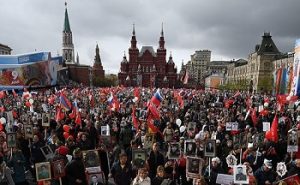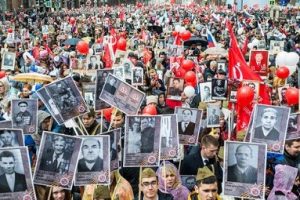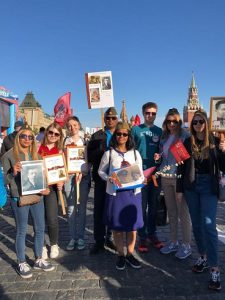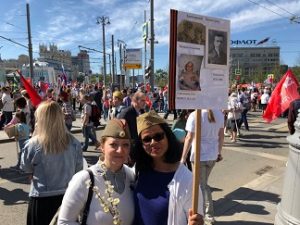
9th May, the Victory Day, is celebrated on a grand scale in Russia. The document ending the Second World War, the German Instrument of surrender, was signed in Berlin late in the evening of 8th May 1945. In Moscow, the clocks had marched on to a new day at the time of signing of this historic document; thus here they celebrate this day of historical importance on the 9th of May. It is, of course, a happy day for all Russians, and many festivities are organised throughout the country. The day in Moscow starts with the Military Parade on the Red Square, where the country displays its latest war technology. The President in his address to the country pays tribute to those who died fighting fascism. The whole nation maintains a minute’s silence to pay homage to all the known and unknown soldiers, whose bravery and sacrifice gave the world a peaceful sky to live under.
For the last four years, a march called, Immortal Regiment March, is organised in Moscow.


The whole crowd was singing songs of the Great Patriotic War. Lyrics of those soulful songs made me tearful, several times. In one of the songs, it says that this day is a joyful one though it brings tears to the eyes. The festivities and celebrations cannot wipe out sorrows and losses of the war years.
Though the distance covered by the procession was not much, strolling singing songs and crying out patriotic slogans took us around three hours to reach the Red Square. Upon arriving the Red Square, we clicked a few photos and headed towards the closest metro station Tretyakovskaya.

My friend Lena, who was the host, is from Saint Petersburg, which was known as Leningrad in the Soviet time. Leningrad was under siege by Nazi soldiers for close to 900 days. Located in the north of Moscow and situated on river Neva, at the head of the Gulf of Finland on the Baltic Sea, the city becomes extremely cold during winters and temperature drops below minus 20-degree centigrade for several days.
Lena comes from a family of army officers. Her parents and grand parents served the Soviet army throughout their lives. Lena’s grandmother, Lyudmila Michaelovna Gerasimova, worked in the army hospitals from the age of 18. She started her job as a nurse in field hospitals during the Finland war of 1939.

Later, during the World War II, she served in Hospital no. 2015 in Leningrad throughout the siege in the capacity of army personnel as a Lieutenant. In 1941, she gave birth to a girl, when her husband was serving somewhere near Leningrad. In January 1942, nobody could trace her husband, and he was enlisted ‘missing.’ Her daughter of 6 months died of cold and hunger in January 1942. The fate had more punishments in store for Lena’s grandmother. Her father, who because of poor vision was not allowed to go to the front, was at that time working in a factory. One day while returning home from work a bomb fell on him and he died on the spot. Some people saw this mishap and informed his wife about his demise. She had a weak heart and too passed away after two days of the incident, unable to bear the painful blow.

It is beyond me to imagine the trauma that a 21-year-old girl had had to undergo in those dark days of January 1942. Within the space of 15-20 days, she had lost her parents, husband and the only child. Because of the siege, people at that time were buried in mass graves and till date, Lena’s family does not know where the final resting places of their close relatives are. Apart from these misfortunes, Lena’s grandmother lost her aunts and uncles too. She could live through those dark years thanks to her young age and her army hospital job. People working in war connected areas were given more rationed food than what the civilians received. The grandmother received 400 grams of bread, instead of 125 grams given to other civilians. For her services towards the country, she was awarded many medals and laurels. She was decorated with the Order of the Great Patriotic War, medal for the Liberation of Leningrad, Zhukov’s medal, Citizen of Leningrad during siege and many more. Now, these decorations are articles of pride for the family. There are stories that hunger was so bad in Leningrad that all dogs, cats and rats had begun to disappear. At times even people were found missing.
 |
| Vasily Pankov |
The other family at the table was Anna’s. Anna’s grandfather, Vasily Pankov, was a Lance Sergeant in the Soviet army. At the time of his death he was 18 years old. He joined the army in January 1943 and died fighting the enemy in June 1944. In a battle near Dneiper in Belarus on 28 June 1944, he killed 11 German soldiers in direct combat. This heroic deed helped their regiment block an apartment building and capture 100 German soldiers barracked there. Later on the same day, he and his regiment fought several fierce battles on the street of the city of Mogilyov and killed around 60 enemy soldiers. He died fighting in one of those battles. For his bravery and heroism he was honoured with the highest award of the Soviet Union- Hero of the Soviet Union. Anna says that though he served in the army for a very short period, his many awards decorate their house. He was honoured with the order of Lenin, the Order of Glory, and the Military Merit Medal. He was awarded all these medals posthumously.
We continued talking about war days’ stories and many other things sitting at the table, when the sky and certain buildings started reflecting bright colours. The Victory Day fireworks had started at 10 in the evening. We went out to the balcony and enjoyed a tiny fraction of the spectacular fireworks displays organised at several points in Moscow. While enjoying the dazzling exhibition, I was thinking what the few remaining veterans of the war feel looking at this spectacular show. I feel along with the jubilant feeling of victory, they experience deep sorrow of great loss at such moments. These veterans don’t want the world to go through any more wars. Festivities of victory are celebrations of peace and peace alone.
Pragati Tipnis is an engineer who teaches yoga and writes. She lives in Moscow.

A very informative story